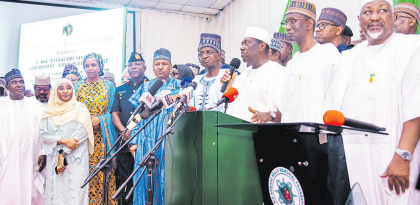Headline
Northern leaders clash over alleged marginalisation at Tinubu performance review summit in Kaduna

Northern Nigeria’s political and civic leaders convened in Kaduna on Tuesday to assess President Bola Ahmed Tinubu’s performance in office, but what was expected to be a unified review quickly exposed deep internal rifts over claims of marginalisation and uneven federal attention to the region.
The high-level gathering, held at the historic Arewa House and organised by the Sir Ahmadu Bello Memorial Foundation, brought together governors, ministers, traditional rulers, civil society leaders, and policy experts from across the 19 northern states. Themed “Assessing Electoral Promises: Fostering Government-Citizen Engagement for National Unity”, the two-day summit aimed to foster dialogue on governance, development, and unity.
READ ALSO: Insecurity in Nigeria has dropped significantly under Tinubu’s administration – NSA Ribadu
Some leaders applauded President Tinubu for initiating infrastructure projects and appointing northerners into strategic positions. Others, however, expressed dissatisfaction over persistent insecurity, deepening poverty, and what they called the government’s neglect of the region.
Speaking on behalf of the President, Secretary to the Government of the Federation, Senator George Akume, defended Tinubu’s Renewed Hope Agenda as a robust governance blueprint. He highlighted achievements in national security, infrastructure, agriculture, and education.
Similarly, National Security Adviser Nuhu Ribadu praised Tinubu’s security interventions, while Governor Inuwa Yahaya of Gombe State, Chairman of the Northern Governors’ Forum, acknowledged economic hardship but affirmed that “visible strides” had been made in key areas.
“Projects like the Abuja–Kaduna–Kano Expressway, Kano–Katsina–Maradi rail line, and Kolmani oilfields are transforming the North,” Yahaya said. He called the meeting a “democratic stocktaking” rather than a political jamboree.
Kaduna Governor Uba Sani strongly defended Tinubu, urging northern leaders to stop playing the “blame game” and instead focus on long-standing regional neglect. He accused some elites of being complicit in the North’s stagnation over the last two decades.
“Let’s be honest: Tinubu didn’t create the insecurity or poverty in the North. The rot started long before him,” Sani said. “Where were the loud voices now blaming him when these things took root?”
Sani credited Tinubu’s government for empowering subnational initiatives like Kaduna’s financial inclusion reforms and agriculture revival, while urging other states to do more.
Dr. Rabiu Kwankwaso, former governor and NNPP’s 2023 presidential candidate, had earlier accused Tinubu’s government of favouring the South at the North’s expense, a sentiment echoed during the forum.
Alhaji Bashir Dalhatu, Chairman of the Arewa Consultative Forum, delivered a scathing critique of the administration’s record, citing worsening insecurity, underfunded agriculture, poor infrastructure, and growing alienation of the North from national budgeting and appointments.
“In spite of giving Tinubu 64% of his total votes, the North feels increasingly ignored,” Dalhatu said. He also decried the relocation of CBN departments to Lagos and the low northern representation in recent federal appointments.
Professor Ango Abdullahi, Chairman of the Northern Elders Forum, described the region’s condition as a national emergency. He cited dismal education statistics, noting that 80% of Nigeria’s out-of-school children are from the North.
“Education, roads, jobs, these are not southern or northern issues. They are national survival issues. But if we don’t see equity, we will demand it loudly,” Abdullahi said.
He called for bold policy redirection, proposing that half of the national budget be devoted to education and road infrastructure in the North.
While emotions ran high, several speakers, including former Niger State Governor Dr Babangida Aliyu, urged restraint and dialogue over division. He blamed past northern leaders for failing to act and warned that continued silence would only worsen the region’s crisis.
“This is not just about President Tinubu. We must look inward. The North must be proactive, not reactive,” he said.
Despite the tensions, the forum marked a rare instance where top federal officials, governors, and civil society leaders jointly discussed the region’s future.
“Let this be the start of a new kind of conversation, one that focuses on results, not rhetoric,” Governor Yahaya said in closing.





















